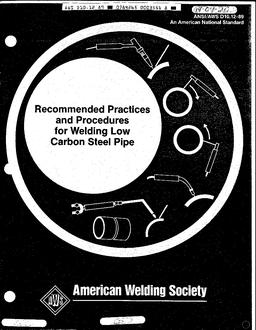AWS D3.6M PDF
This code covers underwater welding in both dry and wet environments. Five basic methods for underwater welding are covered in this specification as follows:
(1) Welding in a pressure vessel in which the pressure is reduced to approximately one atmosphere, independent of depth (dry welding at one atmosphere).
(2) Welding at ambient pressure in a large chamber from which water has been displaced in an atmosphere such that the welder/diver does not work in diving equipment (dry welding in a habitat).
(3) Welding at ambient pressure in a simple open-bottomed dry chamber that accommodates, as a minimum, the head and shoulders of the welder/diver in full diving equipment (dry chamber welding).
(4) Welding at ambient pressure in a small, transparent, gas-filled enclosure with the welder/diver outside in the water (dry-spot welding).
(5) Welding at ambient pressure with the welder/diver in the water without any mechanical barrier between the water and the welding arc (wet welding).
This document is intended to define the important variables associated with underwater welding and to describe welding and inspection procedures so that work of a known quality level can be conveniently specified.
Three weld classes (A, B, and O) are specified herein. They encompass the range of quality and properties currently produced by application of the various methods. Each weld class defines a set of criteria for weldment properties that must be established during qualification, and a set of weld soundness requirements that are to be verified during construction. Welds in each class must meet all the criteria specified for that class. This code does not address the selection of the class that meets the service requirements of a particular application. The selection of the class of weld to be provided is to be prescribed by the Customer.
All provisions of this document apply equally to new construction and to modification and repair of existing structures underwater. This document may be used in conjunction with other applicable codes or specifications for design, construction, or repair.






